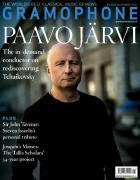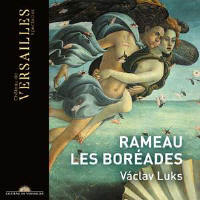Texte paru dans: / Appeared in: |
|
|
Outil de traduction (Très approximatif) |
|
|
Reviewer:
Richard Lawrence Cahusac was the librettist of Zoroastre (1749), an opera with references to Freemasonry. Les Boréades has also been seen as a Masonic piece: the connection is not an obvious one, though Apollo does descend as a deus ex machina to bring the victory of light over darkness. Alphise, the queen of Bactria, is required to marry a Boread – a descendant of Borée, the god of the North Wind. Calisis and Borilée both qualify, without seeming to mind much which of them is chosen. But Alphise loves an outsider, Abaris. When she renounces the throne in order to marry him the outraged Borée whips up a storm: Alphise is abducted and threatened with torture. It is only when Apollo announces that Abaris is his son by a nymph who is herself a Boread that the situation is resolved: Alphise and Abaris are free to marry. The happy ending is signalled almost from the outset, as there’s a heavy hint from Adamas, the High Priest of Apollo, to whom Abaris had been entrusted as a child. Not only that: Cupid descends and presents Alphise with – not a magic flute but a magic arrow, while endorsing her choice of husband. But the lack of tension is more than balanced by the quality of the music, the aged Rameau here in mid-season form. The orchestra includes clarinets and horns, the latter’s hunting calls continuing from the Overture into the first scene. There’s a vigour and charm to the choruses and dances that is quite irresistible. A wonderfully vivid storm connects the third and fourth acts. Does the chorus in Act 4, ‘Terrible Dieu des vents’, really end on a dominant seventh? Yes, it does; it’s followed by a heartfelt air for Abaris, ‘Lieux désolés’, permeated by a weeping two-note figure for the flutes and violins. And Act 5 is introduced by an astonishing sound picture of disconnected phrases. All this is superbly performed by Václav Luks and his Czech chorus and orchestra. The principal soloists are, mostly, French or Belgian. As the much put-upon Alphise, Deborah Cachet is particularly forceful in ‘Songe affreux’, where she dismisses the nightmare that she had described earlier. The metaphor air for Alphise or Sémire, ‘Un horizon serein’, is assigned to Sémire, Alphise’s confidante: less appropriate, but Caroline Weynants spits out the extraordinary repeated quavers – another storm! – with brilliance; indeed it’s hard to distinguish her soprano from that of the similarly bright-edged Deborah Cachet. Mathias Vidal’s Abaris is comparable with Philip Langridge’s five-star performance for John Eliot Gardiner. After the exquisite mezza voce of ‘Charmes trop dangereux’ comes an ardent declaration of love to Alphise, followed in turn by his spirited leading of a chorus in praise of Apollo. There’s fine support from the Boread suitors and from Benoît Arnould as Adamas; Nicolas Brooymans makes a sonorous Borée, the god of the North Wind and cause of the trouble. This is a first-rate performance, on a par with Gardiner’s terrific recording on Erato. That set doesn’t include a libretto (there’s a trenchant explanation of the omission in the booklet). This one does, with a good translation by Christopher Bayton; he must have buried his head in his hands when he received the printed version, with its typos and general muddle. Either recording would grace your collection, as would the DVD of Robert Carsen’s modern production led by Barbara Bonney and Paul Agnew. |
|




